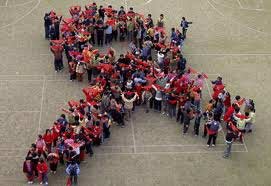From: Religions for Peace, European Council of Religious Leaders, January 2012
Religious Leaders Seek More Urgent Action on HIV
Leaders from five world religions gathered in Toronto, Canada, are encouraging their peers to deepen their engagement and action on HIV by addressing the difficult issues raised by the pandemic in dialogue with people living with HIV.
The leaders also have expressed dismay at the recent drop in funding for the AIDS response just as recent statistics show the effectiveness of prevention and treatment approaches. Governments “can’t slice money from one needed area to another” stated Ruth Messinger, President of the American Jewish World Service. “We have to move beyond the right to ‘affordable’ health and talk about the need for all to have the best attainable health and life.”

In its final reflections on ways forward, participants stated, “As we ourselves recommit to deeper and more active engagement in the HIV response, we call on donor and recipient governments to fulfill their promises and provide the sustainable financial resources to reach the goal in the 2011 Political Declaration that we now see as attainable – zero deaths, zero new infections and zero stigma and discrimination.”
Canon Gideon Byamugisha, who was the first religious leader in Africa to publicly declare his HIV positive status, talked about the personal implications that a spending cap in Uganda is having. “For the first time, people are praying that Gideon dies,” he observed, noting that people now needing anti-retroviral treatment are put on a waiting list until someone currently receiving treatment dies.
The 15 leaders from the Buddhist, Christian, Hindu, Jewish and Muslim traditions, including religious leaders living with HIV, met together with people living with HIV and representatives of organizations active in the response, including the Global Network of People Living with HIV (GNP+), UNAIDS, United Nations Population Fund, and World AIDS Campaign. They assessed efforts to implement the recommendations of the Summit of High Level Religious Leaders in Response to HIV, held in the Netherlands in March 2010 and discussed ways to strengthening religious leadership in the response to HIV.
Reflecting on personal commitments
A basis for the meeting was a report on how religious leaders have fulfilled a personal commitment to action, “Together We Must Do More”. The actions and reflections shared through the report provide an important snapshot of the range of activities and recommendations for strengthening religious leadership in the response to HIV, participants said, although they acknowledge that the report is not, and cannot be, comprehensive of the services and support provided through religious leaders and communities in responding to the HIV pandemic.
Rabbi Julie Schonfeld, Rabbinical Assembly, recalled that “the highest religious value of my tradition is to heal. It overrules every other obligation. If someone is ill, I have an obligation to work to heal. It is not necessary to condone anyone’s behavior in order to work to heal.” Participants highlighted the important mutual role of spirituality and medical treatment.
Schonfeld noted that one thing she has been doing is “to make sure that in the flurry of crises HIV/AIDS is not forgotten.”
Rev. Dr. Richard Fee, Presbyterian Church of Canada also hoped the personal commitment will continue to be a catalyst for action as those who have signed influence others. “It takes just one leader to draw others in.”
Stigma Index provides foundation for dialogue with people living with HIV
Participants were presented with initial results from national surveys documenting levels and sources of stigma experienced by people living with HIV. The Stigma Index is being implemented by national networks of people living with HIV and supported by national partners, GNP+, the International Community of Women Living with HIV, International Planned Parenthood Federation and UNAIDS.
The results which show a significant percentage of people living with HIV facing physical and verbal assault because of their HIV status, along with general low levels of disclosure to religious leaders. Participants felt the results provide a vital resource for religious leaders to reflect together how they could better serve their community, and this type of evidence provides a basis for discussion with people living with HIV on how to address stigma together.
Anish Dua, from the Art of Living Foundation in India, highlighted that the data provides an opportunity for introspection. “If I were a religious leader, and 60% of people in my community consider it ‘not applicable’ to disclose to me that they are living with HIV, I would have to ask myself, How relevant am I to my community?”
Participants strongly encouraged listening and enabling dialogue between religious leaders and people living with HIV as an important way to hear the realities on the ground and find common ground and language to address issues related to human rights and dignity, sexuality and gender equality.
Professor Akhtarul Wasey, of the Zakir Husain Institute of Islamic Studies in India, emphasized the need that “We should work together. We should swim together or we will sink together.”
Frameworks for dialogue between religious leaders and people living with HIV will be developed through the Strengthening Religious Leadership Multifaith Working Group of the Ecumenical Advocacy Alliance, which includes representatives from GNP+ and UNAIDS, and pilot tested over the next eight months.
The meeting was organized by the Ecumenical Advocacy Alliance, based in Geneva, Switzerland, and hosted at the offices of The Presbyterian Church in Canada.
In reflecting on the urgency of the task ahead and the dual roles of religious leaders to both provide spiritual support and to advocate for justice, Canon Gideon Byamugisha stated, “We are called to comfort the agitated and agitate the comfortable”.
For the report on the fullfillment of the personal commitment, see http://www.e-alliance.ch/fileadmin/user_upload/docs/Press_Releases/2011/Religious_Leaders_Report.pdf
